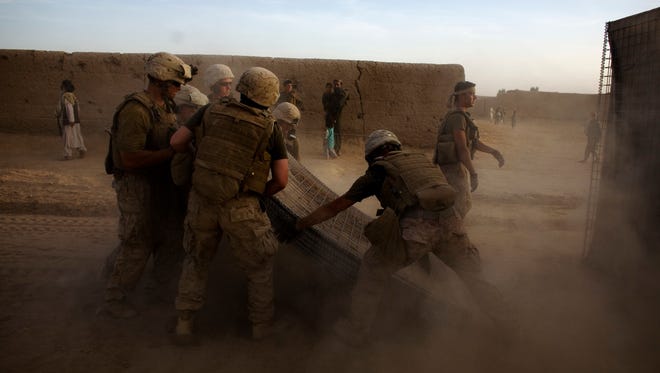Promoter of privatizing Afghan war loses out to generals

WASHINGTON — The key architect of a radical plan to turn over much of the Afghan war to private contractors said Tuesday that President Trump’s top military advisers steered the president toward a conventional military approach that hasn’t worked.
“For now the president is committing to the same policy of the last 16 years,” said Erik Prince, founder of the Blackwater private security firm who formulated the plan.
Prince said Trump might take another look at his proposal if the current strategy fails.
The Pentagon’s top brass had misgivings about Prince's proposal, which involved creating a private air force to support Afghan security forces and hiring former special operations soldiers to live and work with that country’s fledgling military.
Prince said he was blocked from attending Friday's meeting of Trump’s national security staff at Camp David to discuss a strategy for the Afghan war.
“I think the president rolled over,” Prince said. “The policy the president is committing to is the same thing he has been rejecting.”

Trump was frustrated with the lack of progress in Afghanistan and ordered his national security staff to come up with alternatives to the current strategy.
“President Trump asked his generals, ‘How is this different than what my predecessors did for the past 16 years?’" said Jack Keane, a retired four-star Army general. "They had to go back to the drawing board.”
Steve Bannon, the White House chief strategist who stepped down last week, was open to Prince's plan.
Prince, who is the brother of Trump's Education secretary, Betsy Devos, met frequently with members of the administration to discuss his proposal.
What Trump finally settled on appeared closer to the views of Defense Secretary Jim Mattis and Lt. Gen. H.R. McMaster, the president's national security adviser.
"America will continue its support for the Afghan government and the Afghan military as they confront the Taliban in the field," Trump said during his televised address Monday night.
That could clear the way for sending more U.S. advisers to Afghanistan.
The top commander in Afghanistan, Gen. John Nicholson, has requested several thousand additional troops to help advise and assist Afghan forces. About 8,400 U.S. troops are currently in Afghanistan.
Under Prince’s proposal, 5,500 private contractors, primarily former special operations troops, would advise Afghan combat forces, possibly replacing U.S. troops there. His plan also included a 90-plane private air force that would provide air support for Afghan forces.
Prince said the plan would cost less than $10 billion a year, significantly lower than the more than $40 billion the Pentagon has budgeted this year.
More:Analysis: Trump's new Afghanistan war strategy reflects a lack of winning options
More:Cautioning against 'hasty' pullout from Afghanistan, Trump clears path for more U.S. troops
More:Analysis: Trump reverses views on Afghanistan, a war with no easy exits
More:Trump White House weighs unprecedented plan to privatize much of the war in Afghanistan
More:Pakistan's ambassador: We want to work with Trump to end war in Afghanistan